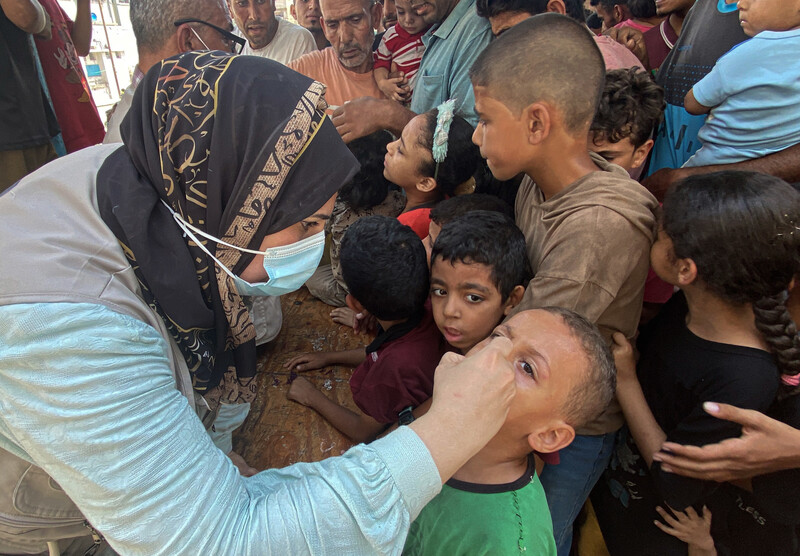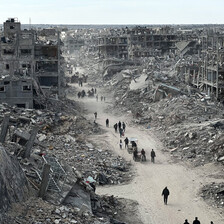The Electronic Intifada 3 October 2024

Palestinian medics administer polio vaccines to children at Al-Falah school in Al-Zaitoun neighborhood in Gaza City on 10 September 2024.
APA imagesMalak al-Ghamari was deeply concerned for her children when she heard that the polio virus had reemerged in Gaza a quarter of a century after it was supposed to have been eradicated.
“I became obsessed with sterilization and hygiene, educating myself about the disease and how to protect against it. I tried to isolate my children from other children in order to protect them from infection,” Malak, a mother of four, told The Electronic Intifada.
In August, Gaza’s health ministry announced a first infection with the polio virus in 25 years – conceivably a new strain – affecting a 10-month-old child who had not been vaccinated due to repeated forced displacements.
So when Yamen, 7, Malak’s son, suddenly refrained from moving or speaking after the family was forced to flee from al-Maghazi area – their fifth displacement – to the house of a relative in Nuseirat, Malak was worried.
She noticed Yamen’s confusion and sudden shaking.
“Then he covered his face with a blanket and said, ‘I don’t want the rubble to fall on my face.’”
Malak tried to calm him and other children down. There were about 15 of them in the house.
Later she woke up to the sound of Yamen’s crying in the night and asking to go to the bathroom, but he seemed unable to stand or walk. His father had to carry him and help him use the toilet.
When he started complaining of severe pain in his hands and legs, it was the last straw for the increasingly concerned parents.
“We took him to Al-Aqsa Martyrs Hospital, where the doctors performed the necessary tests,” Malak said. “They told us that he was suffering from viral neuritis,” Malak said, a condition also known as vestibular neuritis, which is accompanied by a viral infection that usually resolves itself in weeks.
At the time, however, Al-Aqsa hospital was unsafe due to military operations in the area, and patients who could were asked to evacuate. His parents eventually brought Yamen to the Nasser Medical Complex in Khan Younis for further treatment.
New strain
Some 90 percent of Gaza’s 2.3 million people – 1.9 million people – have been displaced from their homes over the past year, many multiple times. They usually find themselves shepherded into overcrowded tent encampments with no clean water for washing, drinking or cooking.
They are the perfect conditions for infectious diseases such as chicken pox and Hepatitis A, which have duly spiked.
Combined with the damage to Gaza’s health sector, which has been decimated in Israel’s year-long indiscriminate and comprehensive bombardment, there is a real and imminent risk to the lives and health of every person in Gaza.
The new strain of polio was discovered in routine wastewater tests in Gaza in July. It is believed that the strain came from the oral polio vaccine, which contains a weakened live virus, and can in rare cases be excreted by vaccinated people to develop into a new, infectious form, Dr. Majdi Dhair, of Gaza’s health ministry, told The Electronic Intifada.
The Israeli military quickly began vaccinating its soldiers once the reemergence of polio in Gaza was confirmed.
But Israel did not heed calls from the UN to implement a ceasefire in order to allow a huge vaccination campaign for the 670,000 children in Gaza under the age of 10.
Dhair said that Gaza health officials nevertheless aimed to vaccinate at least 90 percent of these children with an oral vaccine in two rounds, four weeks apart, to prevent the spread of the disease, but conceded this was a formidable goal in a war zone where circumstances change quickly.
Indeed, though the World Health Organization announced that a first phase of the vaccination campaign was completed in September, plans to finish the campaign last month proved unrealistic. The health agency is now hoping to start phase two in mid-October.
Skepticism
Some Gaza Strip residents have expressed doubts about the seriousness of the international community in protecting children from the virus while remaining silent about the horrors caused by the Israeli military.
Ola al-Masri, who took her triplets to be vaccinated, said her children escaped death twice from Israeli bombings. The first was in their home and the second was in a house to which they were displaced. She wondered if there were vaccines to protect her children from missiles.
“Where is the humanity in piling people into a small space next to the sea, in nylon or cloth tents, and preventing them from any kind of livelihood,” she asked, mocking calls for a humanitarian pause.
“Where is the humanity in giving children a vaccine during the day and allowing them to be killed at night?”
Malak was also scathing.
“My child has suffered greatly from displacement, fear and loss. He lost two aunts and an uncle in the bombing of a house to which we had been displaced during the war.”
Yes, everyone worries about polio, and every other disease afflicting Gaza, Malak said, but “our real worry and danger is the virus of occupation, which has disrupted and paralyzed our children’s childhood.”
Fedaa al-Qedra is a journalist in Gaza.





